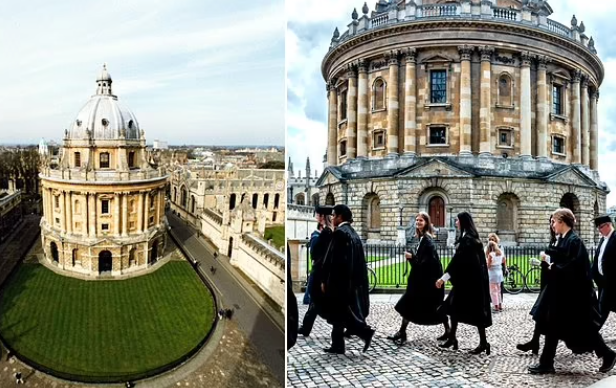Oxford University changes language in 800-year-old Latin ceremony to make it more inclusive for non-binary students_Nhy
An elite British institution will change its 800-year-old Latin ceremony to use gender-neutral language to please non-binary students.
The University of Oxford has conferred its degrees in Latin since the 12th century but the wording used could be changed to make it more inclusive.
A vote will be held on a proposal to change the Latin ceremonial text to cater to those who identify as non-binary.
In a gazette alerting faculties to the planned changes, the introduction of the first gender-neutral degree ceremony in Oxford’s almost 1,000-year history is deemed ‘necessary’, according to the Telegraph.
The changes involve stripping Latin words that are grammatically gendered masculine or feminine.
Instead of referring to masters students as ‘magistri’ which is a masculine word, the proposed text uses the term ‘vos’ which is a neutral term for ‘you’.
The word ‘doctores’, which is also masculine, could be changed.
For undergraduates the word for ‘who’, which has a masculine and feminine form, will be replaced with a neutral word.

The University of Oxford has conferred its degrees in Latin since the 12th century but the wording used could be changed to make it more inclusive

Instead of referring to masters students as ‘magistri’ which is a masculine word, the proposed text uses the term ‘vos’ which is neutral terms for ‘you’

Image: Lord Hague walks with senior university leaders ahead of the Admission ceremony at the University of Oxford in February
The push for gender-neutral language will also apply to other formal occasions at Oxford.
A vote will be held on April 29 and will affect all ceremonies from October this year.
The language changes have been approved by Dr Jonathan Katz, a Latin expert who serves as the university’s Public Orator.
The proposals come as the Labour government cut the £4million Latin Excellence Programme which supported the teaching of language in state schools, raising concerns about an attack on subjects often deemed ‘elitist’.
This led to accusations that Sir Keir Starmer was ‘pulling up the drawbridge behind him’ by axing Latin, despite himself studying the subject.
It also comes as top universities are ‘queering the curriculum’ in a bid to make their courses more welcoming to transgender and non-binary students.
A number of Russell Group institutions are trying to embed ‘queer perspectives’ into courses, a Daily Mail audit shows.
The word ‘queer’ was once considered offensive but has now been ‘reclaimed’ as an empowerment term – by both transgender activists and the gay community.

The push for gender-neutral language will also apply to other formal occasions at Oxford. File photo

A vote will be held on April 29 and will affect all ceremonies from October this year. The University of Oxford is pictured
The idea comes from the movement to ‘decolonise the curriculum’, which involves adding more ethnic minority writers to courses.
Universities have introduced gender-neutral toilets and inclusive language guides.
SOAS, University of London, said in 2022 guidance to staff that they should ’embed trans, non-binary and intersex awareness into their curriculum’ and invite guest lecturers who are ‘trans, non-binary or intersex’.
And in 2021, York University’s English department held a seminar to ‘celebrate ways of queering the curriculum’, including studying ‘encounter LGBTQ+ writers from across history’.
A University of Oxford spokesperson told MailOnline: ‘The proposed changes before Congregation create a single text for each ceremony, covering all options students now have for registering genders in line with legal reporting requirements for higher education.’




